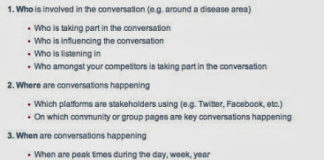The recent DTC moratorium scare from Congress — which has since dissipated (see “DTC Moratorium Yanked From PDUFA“) — had Direct-to-Consumer (DTC) marketers scrambling to think of a replacement consumer marketing strategy. In that scramble, blogs leaped to mind.
One such mind was that of Bob Ehrlich, Chairman at DTC Perspectives, Inc., who writes a weekly e-mail commentary on trends in DTC. His May 4, 2007 piece entitled “Blogs and DTC” posed an interesting question:
“While [blogging is] now aimed primarily at industry insiders, one has to wonder when it will be a dominant consumer tool aimed at reviewing drug performance, side effects and risks. Blogs on drug selection may soon be a key tool in spreading word of mouth on new drugs.”
Ehrlich was thinking about how pharmaceutical marketers can use blogs to “spread the word” in the future when DTC might be banned. “I am not exactly sure how, as a marketer, to incorporate blogs in my brand plans,” said Ehrlich. “You cannot control them or measure them as with other media.”
While pharma marketers are stymied by blogs and trying to work out a strategy for using blogs and other “Web 2.0” technologies to promote products, consumers and physicians are already discussing drugs in their own blogs and related social networks.
There are blogs written by physicians focused on drugs. An example is CL Psych, which is written by “an academic with a respectable amount of clinical experience and no drug industry funding. Certain things about clinical psychology, the drug industry, psychiatry, and academics drive me nuts,” says this anonymous blogger.
Consumers and patients also write blogs. A good example of such a blog is Diabetes Mine, written by Amy Tenderich, a person with Type I diabetes. Amy covers more than just drugs in her blog, but a recent post entitled “Januvia: Is It ‘Oral Byetta’ or Just a Lucky Break?” is an example of what the pharmaceutical industry must contend with.
A few months ago, I pointed out that Revolution Health, a new social networking site founded in 2005 by Steve Case (former CEO of AOL), was poised to pit the “wisdom of the crowd” against the BS of drug marketers (see “Revolution Health and the Wisdom of Crowds“). On the site visitors can rate Rx drugs according effectiveness, side effects, ease of use, and cost effectiveness.
On this site you can see what many people are saying about specific drugs. You can find Viagra’s rating here.
 Listen to a Pharma Marketing Talk interview with Jay Silverstein, the COO of Revolution Health, about its new health portal web site. Will pharmaceutical marketers warm up this site for advertising and sponsorship opportunities? See “Revolution Health and the Wisdom of Crowds.“
Listen to a Pharma Marketing Talk interview with Jay Silverstein, the COO of Revolution Health, about its new health portal web site. Will pharmaceutical marketers warm up this site for advertising and sponsorship opportunities? See “Revolution Health and the Wisdom of Crowds.“
Web 2.0 technology like Revolution Health and blogs is still in its infancy. But over time it could become become a more powerful influencer than DTC.
“In this new world of blogging,” says Ehrlich, “drug companies are going to have to deal with a high volume of unregulated drug information. Just keeping a tab on what is being said probably takes a full time person screening the major blog sites. Like it or not drug companies will be forced to respond to a blogger story. After all, blogs multiply and will not just die like the good old days of a bad network news story.”
 I have many questions for Mr. Ehrlich about Blogs and DTC. I decided, therefore, to invite him to be a guest on my May 24, 2007 Pharma Maketing Talk podcast entitled “Blogs vs. DTC: What’s Best for Consumers?“
I have many questions for Mr. Ehrlich about Blogs and DTC. I decided, therefore, to invite him to be a guest on my May 24, 2007 Pharma Maketing Talk podcast entitled “Blogs vs. DTC: What’s Best for Consumers?“
Some questions I intend to ask include:
- Are consumers turning towards blogs to get information about drugs and medical treatment options? Are these primarily patient/consumer blogs or also physician blogs?
- Are blogs inherently less credible than other sources of drug information on the Internet? If so, how so?
- Many patient blogs offer opportunities to be “harnessed” by pharmaceutical marketers. What dangers do marketers face when getting involved in the blogosphere either by placing ads on blogs or more pro-actively engaging in the conversation?
- How can pharmaceutical companies relinquish some control over content to enable to better co-operate with bloggers?
If you have any questions you’d like me to include in our discussion, let me know by posting a comment to this post. You can also listen in to the live podcast and call in with your questions. For more information, go here.









![6 Digital Tools at the Center of Healthcare Digitalization [INFOGRAPHIC]](http://ec2-54-175-84-28.compute-1.amazonaws.com/pharma-mkting.com/wp-content/uploads/2021/04/6DigitalTools_600px-100x70.jpg)




